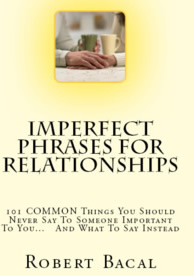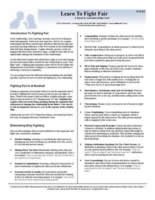All Couples Should Learn To FIght Fair. Here's How
Check out our mini-guide on how to fight fair, and stop letting badly handled conflict cause pain in your relationships. Download it NOW!
Search Our Network Of Business and Personal Development Sites
Learn to prevent unnecessary conflicts before they explode
Is Conflict Prevention The Same As Conflict Avoidance? By Robert Bacal
Summary: Some people think that PREVENTING conflict is the same as avoiding conflict, and that is very far from the truth. In this article we describe the differences, and how conflict prevention involves the elimination of UNNECESSARY conflict that occurs in the workplace.
Since my book, Conflict Prevention In The Workplace, was published, I occasionally come across people who have some sort of objection to the idea of conflict prevention. Their perspective seems to be that if one is going about preventing conflict, one is going about avoiding it, or hoping it will go away, or sweeping it under the rug.
This position, unfortunately often expressed by people trying to help groups work through conflict, or those who teach conflict management techniques, is based on a narrow understanding of conflict, and a limited understanding of what conflict prevention involves. So, rather than respond to people one by one I've written this article.
Before we can explain, some background is a good idea. There are various approaches to conflict and how to deal with it.
The Logical Conflict Management Approach
The logical conflict management approach rests on the assumption that people can and will make conscious decisions about how they will deal with a specific conflict. The approach outlines different modes of dealing with conflict. For example:
- avoidance
- collaboration
- power-based
- compromise
The difficulty with this approach (and we will just mention it), is it treats conflict as something that occurs within two computers, that is easy to analyze, and isn't heavily influenced by a person's emotional state. While this works with conflicts that don't involve much emotional heat, it doesn't make sense when people get angry, and frustrated. Angry and frustrated people don't often operate in such an analytic mode.
Emotional Models
At the other end of the spectrum is an understanding of conflict as involving emotional energy. Generally, you will find proponents of these models in the ranks of facilitators, some psychologists and those on the more "touchy-feely" side
They see conflict as an emotional encounter. They also tend to believe that the suppression of the emotional energy associated with conflict is sweeping the problem under the rug. What's more important is that some feel that this is destructive -- that unaddressed conflicts fester and gets worse if neglected. So within this way of thinking, avoidance of a conflict, or ignoring a conflict, is damaging and dangerous.
It's often these folks that do not distinguish between conflict avoidance and conflict prevention.
It's likely neither of these approaches is "the best" or is right. Like anything the truth is in the middle somewhere. Regardless though it IS important to distinguish between avoidance and prevention.
Difference Between Avoidance & Prevention
To start with a basic analogy, is there a difference between preventing contracting AIDS by the use of appropriate precautions, and avoiding or not seeking treatment if one has contracted it? Of course there is. It's pretty obvious when we think of it that way.
The idea of conflict prevention recognizes that conflict takes many forms. Like the logical conflict managers, we recognize that there is some conflict that is destructive, some that is hopeless and can never be resolved (for all practical purposes). We also recognize that conflict can be a good thing, that good things can come out of addressing it, and sometimes, NOT addressing it is a bad idea.
So, we talk about destructive conflict and constructive. Destructive conflict is conflict that has a low probability of being resolved, and is primarily personality or emotion driven, rather than conflict that is issue based.
For example, if you and I disagree about how much you should pay me, we disagree on an issue - pay.
If however you and I aren't getting along because I don't "like" you, this is a personality or emotion driven situation.
Often, issue driven conflict turns into emotion based conflict, and that's one thing we need to make sure doesn't happen. The reason is simple. Emotion based or personality based conflicts are very difficult to deal with, with a relatively low probability of resolution. It's not impossible (perhaps nothing is impossible), but often it's unlikely.
That's why we use the term destructive conflict; because pursuing the issue will often make things worse. Sometimes, one must leave the conflict as it is and make the best of it because pursuing it will make it worse.
We are always going to have issue based disagreements and conflict. Well intentioned people often disagree. What we need to do, though is focus our attention on reducing the incidence of personality or emotion based conflict because a) once it gets going it's hard to fix, and b) because there are techniques that can reduce its frequency.
So conflict prevention isn't about preventing issue based disagreements at all. It isn't about keeping our mouths shut if we disagree. What it IS about is reducing conflict that comes from behavior and ways of communicating that create unnecessary, unresolvable conflicts.
It's about learning to say things in ways that do not get people's defenses up. It's about saying things so others don't get pissed off because of your choice or words, tone, phrasing or body language. It's a tool for the resolution of issue based conflict, not a way of avoiding it.
But overall it's an approach which follows the following principle:
If we are going to be in conflict, we want it to be about something that is important, and should occur in a way that brings a positive outcome.
We do not want to create conflict because of our tone, communication, behavior, etc, that has no issue except the WAY we are handling it.
 Manage Conflict - Resolve Conflict - Prevent Conflict
Manage Conflict - Resolve Conflict - Prevent Conflict 

